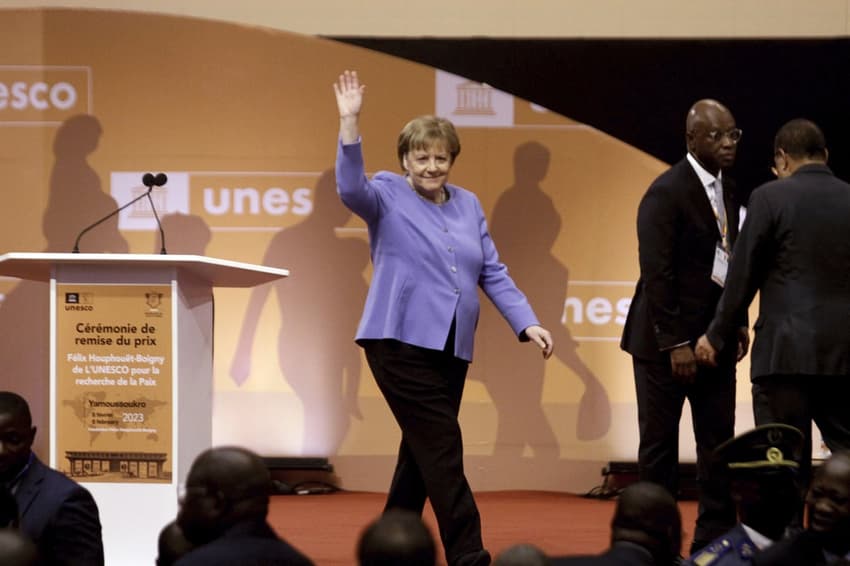Merkel receives UNESCO peace prize for welcoming refugees

Germany's former chancellor
Angela Merkel on Wednesday received a prestigious UN award for opening her country to refugees during her time in office.
Merkel was hailed for welcoming more than 1.2 million refugees and asylum seekers to Germany in 2015 and 2016 as she was awarded the Felix Houphouet-Boigny UNESCO Peace Prize in Ivory Coast's capital Yamoussoukro.
"The jury wanted to honour the courageous decision taken in 2015 to welcome more than a million refugees... when at the same time so many voices were calling for the closure of Europe," said Audrey Azoulay, director general of the United Nations Educational, Scientific and Cultural Organization.
READ ALSO: How well have refugees integrated into Germany since 2015?
"You were, at that time, the vision of courage in politics."
Merkel's decision came at the peak of a crisis fuelled by the war in Syria.
"Respecting, preserving and sharing human rights is the mission of each of us. We decided that it was necessary to respect these principles in our migration policy," said the veteran former leader, who spent 16 years at the helm and stepped down in 2021.
READ ALSO: Angela Merkel leaves German chancellery after 16 years
"This was only possible because many people rolled up their sleeves on the ground," she said at the Felix Houphouet-Boigny Foundation, named after Ivory Coast's first president.
"Despite the hostility of public opinion, you took the decision to open Germany's borders to refugees fleeing conflict zones," said Ivorian President Alassane Ouattara.
"You have reminded all world leaders of their duty of solidarity towards all humans," he added.
Around 2,000 people were invited to the ceremony, which was set up in 1989 and has previously handed awards to Nelson Mandela, Yasser Arafat, Yitzhak Rabin and Francois Hollande.
Comments
See Also
Merkel was hailed for welcoming more than 1.2 million refugees and asylum seekers to Germany in 2015 and 2016 as she was awarded the Felix Houphouet-Boigny UNESCO Peace Prize in Ivory Coast's capital Yamoussoukro.
"The jury wanted to honour the courageous decision taken in 2015 to welcome more than a million refugees... when at the same time so many voices were calling for the closure of Europe," said Audrey Azoulay, director general of the United Nations Educational, Scientific and Cultural Organization.
READ ALSO: How well have refugees integrated into Germany since 2015?
"You were, at that time, the vision of courage in politics."
Merkel's decision came at the peak of a crisis fuelled by the war in Syria.
"Respecting, preserving and sharing human rights is the mission of each of us. We decided that it was necessary to respect these principles in our migration policy," said the veteran former leader, who spent 16 years at the helm and stepped down in 2021.
READ ALSO: Angela Merkel leaves German chancellery after 16 years
"This was only possible because many people rolled up their sleeves on the ground," she said at the Felix Houphouet-Boigny Foundation, named after Ivory Coast's first president.
"Despite the hostility of public opinion, you took the decision to open Germany's borders to refugees fleeing conflict zones," said Ivorian President Alassane Ouattara.
"You have reminded all world leaders of their duty of solidarity towards all humans," he added.
Around 2,000 people were invited to the ceremony, which was set up in 1989 and has previously handed awards to Nelson Mandela, Yasser Arafat, Yitzhak Rabin and Francois Hollande.
Join the conversation in our comments section below. Share your own views and experience and if you have a question or suggestion for our journalists then email us at [email protected].
Please keep comments civil, constructive and on topic – and make sure to read our terms of use before getting involved.
Please log in here to leave a comment.